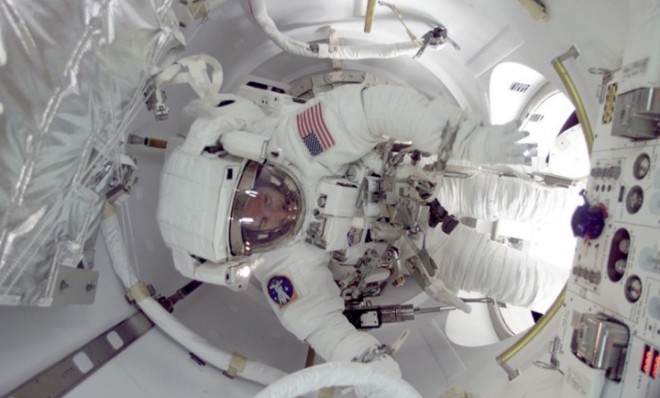Are cosmic rays giving astronauts Alzheimer's?
New research suggests space radiation may lead to the degeneration of astronauts' brains


A free daily email with the biggest news stories of the day – and the best features from TheWeek.com
You are now subscribed
Your newsletter sign-up was successful
As if space travel weren't risky enough already, now astronauts have to grapple with the fear that being in deep space might fry their brains. The radiation in space is similar to what might be experienced in a nuclear explosion, but here on Earth, we're protected by our planet's magnetic field. When astronauts leave Earth's orbit, however, that layer of protection is gone, and human bodies are bombarded by radioactive particles, which have already been linked to increased cancer risk and cardiovascular issues. But "perhaps the greatest danger of such prolonged exposure," says Alasdair Wilkins at io9, is "the degeneration of the brain itself."
Researchers at the University of Rochester Medical Center wanted to study how prolonged time spent in deep space could affect astronauts. So researchers exposed mice to levels of radiation similar to what humans would encounter on a three-year round trip to Mars, then tested the mice's memories. The results were startling. Mice exposed to radiation failed to recall objects and places, and their brains showed an increased buildup of beta amyloid, a protein considered one of the clearest indicators of Alzheimer's disease. "These findings clearly suggest that exposure to radiation in space has the potential to accelerate the development of Alzheimer's disease," says researcher M. Kerry O'Banion.
This all comes at an interesting time in the field of deep space travel, as NASA has planned missions to an asteroid in 2021 and Mars in 2035. Will it be possible to shield astronauts from harmful radiation? Not really. To do so, "one would have to essentially wrap a spacecraft in a six-foot block of lead or concrete," O'Banion says. Designing a spacecraft with such a shield that could be launched from Earth would be quite a feat of engineering, Wilkins notes. Perhaps in the next decade we will have made advances in Alzheimer's treatment and prevention, but what's clear is that "this is yet another factor that NASA, which is clearly concerned about the health risks to its astronauts, will need to take into account as it plans future missions," says O'Banion.
The Week
Escape your echo chamber. Get the facts behind the news, plus analysis from multiple perspectives.

Sign up for The Week's Free Newsletters
From our morning news briefing to a weekly Good News Newsletter, get the best of The Week delivered directly to your inbox.
From our morning news briefing to a weekly Good News Newsletter, get the best of The Week delivered directly to your inbox.
Sources: ABC News, io9, Smithsonian, UPI
A free daily email with the biggest news stories of the day – and the best features from TheWeek.com
Jessica Hullinger is a writer and former deputy editor of The Week Digital. Originally from the American Midwest, she completed a degree in journalism at Indiana University Bloomington before relocating to New York City, where she pursued a career in media. After joining The Week as an intern in 2010, she served as the title’s audience development manager, senior editor and deputy editor, as well as a regular guest on “The Week Unwrapped” podcast. Her writing has featured in other publications including Popular Science, Fast Company, Fortune, and Self magazine, and she loves covering science and climate-related issues.
-
 Ex-South Korean leader gets life sentence for insurrection
Ex-South Korean leader gets life sentence for insurrectionSpeed Read South Korean President Yoon Suk Yeol was sentenced to life in prison over his declaration of martial law in 2024
-
 At least 8 dead in California’s deadliest avalanche
At least 8 dead in California’s deadliest avalancheSpeed Read The avalanche near Lake Tahoe was the deadliest in modern California history and the worst in the US since 1981
-
 Political cartoons for February 19
Political cartoons for February 19Cartoons Thursday’s political cartoons include a suspicious package, a piece of the cake, and more
